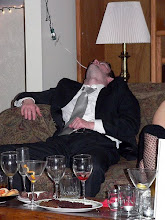 |
| fig. 1: Not James Bond |
Henry is also thirteen, or thereabouts, the exact age a young boy would be to pick up James Bond. I'm imagining Philip, in that long summer of 1983, taking his kid to see a James Bond movie, sitting in the dark watching Octopussy's tale of double entendres and daring-do, of megalomaniacal Russian generals and all-female circus troupes storming a castle, of an exiled Afghan prince played by a Frenchman and his glowering Sikh bodyguard.
Philip, who's killed people. Whose job on paper might look like James Bond's if you squint, but who differs from the character in nearly every respect. Who carries a laundry list of alternate identities. Who has one marriage assigned to him by the Soviet State and another he crafted out of necessity, a long con to get closer to the FBI, a sham marriage just now about to collapse all around him.
The obvious take is that The Americans is a more realistic portrayal of spying, and it is. It's a stretch to believe James Bond would have survived fifty-three years in the cinematic landscape as anything but an adventure character, nor does Fleming's conception of the character have very deep roots in any realistic portrayal of intelligence gathering. It was never going to be a half century of hushed conversations and muted betrayals and long, drawn out operations staged for a sliver of intelligence on a bomber plane. The best we get here is a disguise mustache.
Still, it seems churlish if not impossible to really complain when the Bond at the heart of all this action is Roger Moore. Though he'd been eyeing the exits at least since the previous installment, Moore keeps the eye twinkle and the light touch that so defined the charm of his character here. Again, it's difficult to imagine what the characters of Philip and Elizabeth Jennings might make of this man, the only spy real or fictional whose most recognizable catch phrase is to tell you his actual given name. Of all of the actors to play the role, Moore seems the most to be enjoying himself, playing the character with an infectious joi de vivre. Granted, it's the joi de vivre of what plays today as an emotionally stunted man-child, but it's hard to argue with the man's charm. Moore has impeccable comic delivery, which suits the campier nature of this story, though he doesn't lose sight of the stakes. His performance as the character is anchored in a consistency that keeps everything recognizable, even when it tilts through to unbelievability.
 |
| fig 2: The KGB sure never splurges on mini-planes that run on 87 Octane |
And, as unbelievable plots go, this one's a humdinger. I admit to losing the thread about two thirds of the way through, as I failed to connect the film's original mystery--the smuggling out of Eastern Europe several fake Faberge eggs, which is somehow tied to funding Soviet efforts to bolster its tank battalions across the Iron Curtain. More importantly it leads Bond straight into the clutches of Bad Guy Kamal Khan, the aforementioned "exiled Afghan Prince" [when did the Af monarchy collapse?] and his partner-in-smuggling, Octopussy.
 |
| fig. 3: Remember me? I was in The Man with The Golden Gun! |
Luckily, Octopussy doesn't have this problem. It has a host of other problems, mainly down to the unfortunate exoticism of films made by Westerners set in non-Western countries. Though India is gorgeously deployed here, it suffers from the same problem Afghanistan did in The Living Daylights. It's a backdrop. It's a gorgeous backdrop, and this is one of the better looking Bond films for it, but to the extent that any of the Indian characters have agency at all, it's to help James Bond because they work for British intelligence, or to try and murder the shit out of him because they work for Kamal Khan.
 |
| fig. 3: Not sure when the Glowering Sikh Bodyguard first became a thing, but I've seen it often enough to suspect it didn't originate here |
In fact, I'm hard-pressed after watching the film last weekend to remember where in India Bond actually went. According to the film's Wikipedia page, he goes to Rajasthan, which happens to be the largest state in India, so that isn't exactly a help. He's in a city at one point, but it's not said where, and in his attempt to escape Kamal Khan's palace (while pursued by guys on elephants) he runs through a checklist of Exotic India Tropes. Jungle? Check. Very Large, Presumably Venemous Spiders? Check. Tiger, Just, You Know, Walking Around? Check. Leeches? Check. It's the same problem as The Living Daylights, where Afghanistan was represented by one Soviet air force base and one dusty mujaheddin encampment and a whole lotta mountains.
Some of this would be less of a problem if Kamal Khan weren't played by a Frenchman. Louis Jourdan does a fine job here playing a smugly villainous ne'er-do-well, but Octopussy sits on the shoulders of a long-standing tradition of racebent casting going back as far as the history of film. Hell, in 1983 we're only sixteen years out from Sean Connery playing the Least Convincing Japanese Man Since Marlon Brando. So not only do the people in these countries not really get a say in how their lives are affected by this fictional tug-of-war between these powers (apt, if unintentional metaphor here), but if they have a strong enough role to play, they don't even get to be played by someone from the region. At least Daylights' Art Malik was Pakistani.
 |
| fig. 4: France. I come from France. |




No comments:
Post a Comment